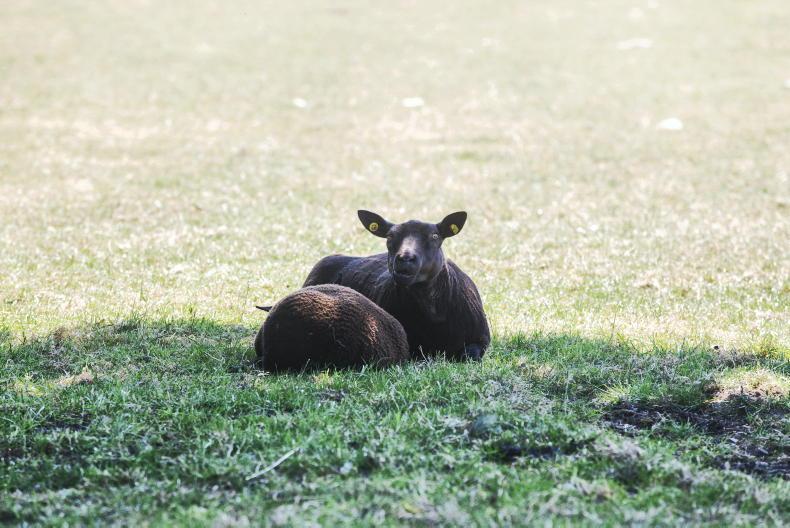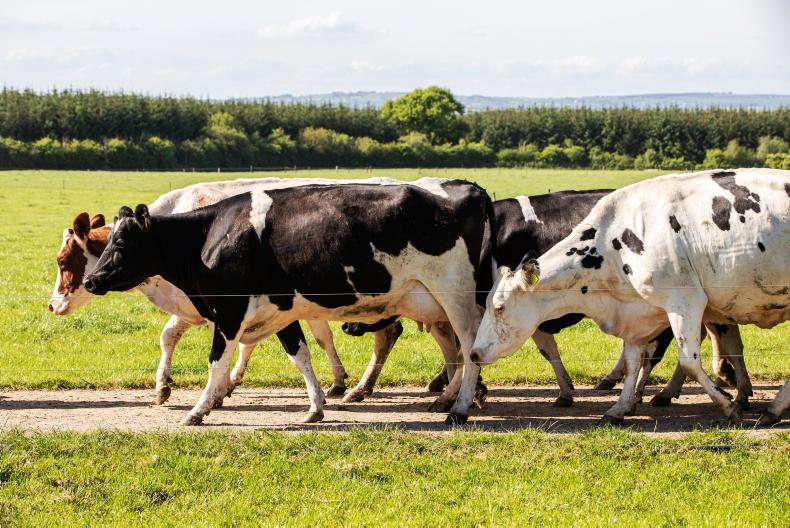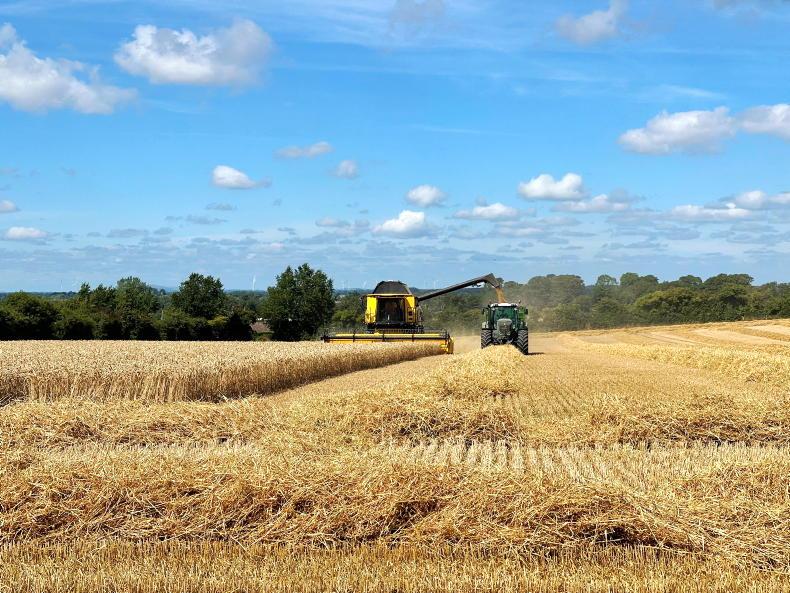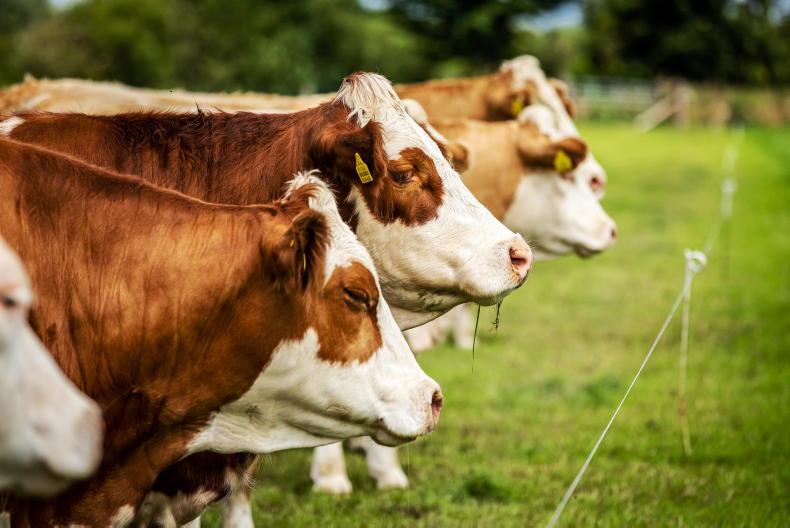With temperatures to pass 30°C this weekend and exceed 25°C for several days in succession, there are a number of steps farmers should take to ensure their own and their animal’s health and safety in the hot weather. The Irish Farmers Journal has compiled heatwave management tips to be mindful of.
All livestock farmers should ensure that water troughs are working and have good flow rates, with any issues here being one of the primary causes of heat stress in animals.
Shade should be provided at all times and unnecessary movement or work with stock should be avoided during peak daytime temperatures.
High temperatures have the potential to trigger issues that would not normally be seen on sheep farms and farmers should take precautions to prevent issues occurring.
As early lambing flocks prepare for and commence breeding, there is a risk of heat-related fertility issues in rams. There can be detrimental effects on the quality of semen if a ram’s body temperature exceeds 40°C.
Rams and ram lambs most at risk are those on an intensive concentrate-based diet due to the stress their bodies are already under.

Lambs that are being offered creep feed and later-lambing ewes which are still suckling lambs and producing milk will also have a particularly high-water demand during heatwave conditions. \ Claire-Jeanne Nash
Farmers should ensure all sheep have good access to shelter and a convenient water supply and to be mindful that rams may not leave shelter freely to seek out water if they are facing heat stress.
Therefore, a temporary water supply may need to be provided adjacent to where rams are eating and sheltering.
Where no shelter is readily available, rams should be moved into paddocks where mature hedging or trees are present. If feasible, rams could also be given access to a shed with good ventilation.
Lambs that are being offered creep feed and later-lambing ewes which are still suckling lambs and producing milk will also have a particularly high water demand during heatwave conditions.
Transport
Care should be taken when transporting sheep during peak temperatures. Animals are at risk of succumbing to intense heat where they are packed tightly and the appropriate stocking rate is not adhered to.
Sheep that go down in a load will survive for a much shorter timeframe, so it is wise to make regular stops to check that all animals are standing.
Farmers should also ensure sheepdogs do not suffer from heat stress or exhaustion by avoiding work during peak temperatures and allowing them ample rest.
Dairy herds are particularly prone to heat stress brought about by a lack of water intake.
Average cow water intake of 50l to 60l/day in normal weather almost doubles during warm weather, so farmers should ensure there are no slow-filling water troughs in paddocks and take action where required.
Heat stress is when the cow needs to work harder to cool down. The hotter the temperature, the harder she needs to work and the more energy she will have to use to cool off, rather than be in milk production.
If cows are housed for part of or all of the day, temperatures in a shed with poor ventilation could be higher than the outside temperature, so farmers running a confinement system need to be particularly careful to watch for signs of heat stress.

Cows exposed to heat stress will use more energy to cool off, impacting milk production. \ CJ Nash
The heatwave is set to further affect grass growth,, with dairy farmers likely to have to put in extra feed as required.
Farmers should refrain from adding too much feed too quickly, but instead should utilise grass as much as possible before it wilts away.
With harvest in full swing across the country, the hot, dry weather poses a significant risk for farmers due to machinery fires.
Recently, a farmer in Kilkenny lost 10ac of barley to a fire sparked during harvest. The incident demonstrates how quickly this can happen.
Tillage farmers are advised to keep a fire extinguisher readily available to quickly put out any fires that may occur.
This fire extinguisher should be in reach of the machine operator at a height that they can reach to avoid injuring themselves when accessing it.

Tillage farmers should keep a fire extinguisher readily available while harvesting in heatwave conditions.
For example, machine operators should not have to climb up on the combine to get access to the fire extinguisher if it is mounted externally.
If possible, farmers should also keep a slurry tank full of water and spare tractor nearby to have at hand if required.
It is also recommended that farmers keep a compressor at hand to blow any chaff and straw out of rotating parts of a machine at regular intervals, as a build-up can present a fire hazard.
Regular farm machinery health and safety protocol applies throughout the harvest season, with contractors encouraged to ensure all machine operators are trained and aware of the risks involved.
Beef farmers should apply a fly-repellent pour-on to help reduce the risk of mastitis in cows, dry cows and heifers that encounter higher fly activity in shaded areas over the coming days.
With a shortage of grass, many farmers are feeding high levels of concentrate to store or forward cattle at present to maintain thrive, but with such low covers of grass, cattle will struggle to get enough forage in their diet.

Cattle will experience higher fly activity in shaded areas over the coming days. \ Philip Doyle
As such, a lack of rumen fibre, combined with feeding 3kg to 4kg/head of concentrate in one offering, will increase the risk of acidosis in cattle.
When concentrate levels increase to 3kg or above, farmers should split the allocation into two smaller feeds.
Feeding concentrate will also increase dry matter intake and, subsequently, water intake.
Introducing creep feed to spring-born calves will reduce the heatwave nutritional stress on spring-calving cows as they try to maintain milk production and settle in-calf again.
This supplementation will also maintain calf performance, crucial if preparing weanlings for autumn sales.
Silage
Where cattle are being offered silage to stretch grazing covers, it is important to keep supplementary fodder fresh and palatable. High temperatures can cause silage to heat and spoil if cattle are not consuming the bale fast enough.
Farmers should also take precautions to look after themselves during heatwave conditions. Prolonged work in peak sunshine will leave farmers exposed to sunburn, a high-risk factor for skin cancer.
Caps and hats should be worn to keep the sun off your face and suncream should be worn at all times.
With temperatures to pass 30°C this weekend and exceed 25°C for several days in succession, there are a number of steps farmers should take to ensure their own and their animal’s health and safety in the hot weather. The Irish Farmers Journal has compiled heatwave management tips to be mindful of.
All livestock farmers should ensure that water troughs are working and have good flow rates, with any issues here being one of the primary causes of heat stress in animals.
Shade should be provided at all times and unnecessary movement or work with stock should be avoided during peak daytime temperatures.
High temperatures have the potential to trigger issues that would not normally be seen on sheep farms and farmers should take precautions to prevent issues occurring.
As early lambing flocks prepare for and commence breeding, there is a risk of heat-related fertility issues in rams. There can be detrimental effects on the quality of semen if a ram’s body temperature exceeds 40°C.
Rams and ram lambs most at risk are those on an intensive concentrate-based diet due to the stress their bodies are already under.

Lambs that are being offered creep feed and later-lambing ewes which are still suckling lambs and producing milk will also have a particularly high-water demand during heatwave conditions. \ Claire-Jeanne Nash
Farmers should ensure all sheep have good access to shelter and a convenient water supply and to be mindful that rams may not leave shelter freely to seek out water if they are facing heat stress.
Therefore, a temporary water supply may need to be provided adjacent to where rams are eating and sheltering.
Where no shelter is readily available, rams should be moved into paddocks where mature hedging or trees are present. If feasible, rams could also be given access to a shed with good ventilation.
Lambs that are being offered creep feed and later-lambing ewes which are still suckling lambs and producing milk will also have a particularly high water demand during heatwave conditions.
Transport
Care should be taken when transporting sheep during peak temperatures. Animals are at risk of succumbing to intense heat where they are packed tightly and the appropriate stocking rate is not adhered to.
Sheep that go down in a load will survive for a much shorter timeframe, so it is wise to make regular stops to check that all animals are standing.
Farmers should also ensure sheepdogs do not suffer from heat stress or exhaustion by avoiding work during peak temperatures and allowing them ample rest.
Dairy herds are particularly prone to heat stress brought about by a lack of water intake.
Average cow water intake of 50l to 60l/day in normal weather almost doubles during warm weather, so farmers should ensure there are no slow-filling water troughs in paddocks and take action where required.
Heat stress is when the cow needs to work harder to cool down. The hotter the temperature, the harder she needs to work and the more energy she will have to use to cool off, rather than be in milk production.
If cows are housed for part of or all of the day, temperatures in a shed with poor ventilation could be higher than the outside temperature, so farmers running a confinement system need to be particularly careful to watch for signs of heat stress.

Cows exposed to heat stress will use more energy to cool off, impacting milk production. \ CJ Nash
The heatwave is set to further affect grass growth,, with dairy farmers likely to have to put in extra feed as required.
Farmers should refrain from adding too much feed too quickly, but instead should utilise grass as much as possible before it wilts away.
With harvest in full swing across the country, the hot, dry weather poses a significant risk for farmers due to machinery fires.
Recently, a farmer in Kilkenny lost 10ac of barley to a fire sparked during harvest. The incident demonstrates how quickly this can happen.
Tillage farmers are advised to keep a fire extinguisher readily available to quickly put out any fires that may occur.
This fire extinguisher should be in reach of the machine operator at a height that they can reach to avoid injuring themselves when accessing it.

Tillage farmers should keep a fire extinguisher readily available while harvesting in heatwave conditions.
For example, machine operators should not have to climb up on the combine to get access to the fire extinguisher if it is mounted externally.
If possible, farmers should also keep a slurry tank full of water and spare tractor nearby to have at hand if required.
It is also recommended that farmers keep a compressor at hand to blow any chaff and straw out of rotating parts of a machine at regular intervals, as a build-up can present a fire hazard.
Regular farm machinery health and safety protocol applies throughout the harvest season, with contractors encouraged to ensure all machine operators are trained and aware of the risks involved.
Beef farmers should apply a fly-repellent pour-on to help reduce the risk of mastitis in cows, dry cows and heifers that encounter higher fly activity in shaded areas over the coming days.
With a shortage of grass, many farmers are feeding high levels of concentrate to store or forward cattle at present to maintain thrive, but with such low covers of grass, cattle will struggle to get enough forage in their diet.

Cattle will experience higher fly activity in shaded areas over the coming days. \ Philip Doyle
As such, a lack of rumen fibre, combined with feeding 3kg to 4kg/head of concentrate in one offering, will increase the risk of acidosis in cattle.
When concentrate levels increase to 3kg or above, farmers should split the allocation into two smaller feeds.
Feeding concentrate will also increase dry matter intake and, subsequently, water intake.
Introducing creep feed to spring-born calves will reduce the heatwave nutritional stress on spring-calving cows as they try to maintain milk production and settle in-calf again.
This supplementation will also maintain calf performance, crucial if preparing weanlings for autumn sales.
Silage
Where cattle are being offered silage to stretch grazing covers, it is important to keep supplementary fodder fresh and palatable. High temperatures can cause silage to heat and spoil if cattle are not consuming the bale fast enough.
Farmers should also take precautions to look after themselves during heatwave conditions. Prolonged work in peak sunshine will leave farmers exposed to sunburn, a high-risk factor for skin cancer.
Caps and hats should be worn to keep the sun off your face and suncream should be worn at all times.










 This is a subscriber-only article
This is a subscriber-only article










SHARING OPTIONS: